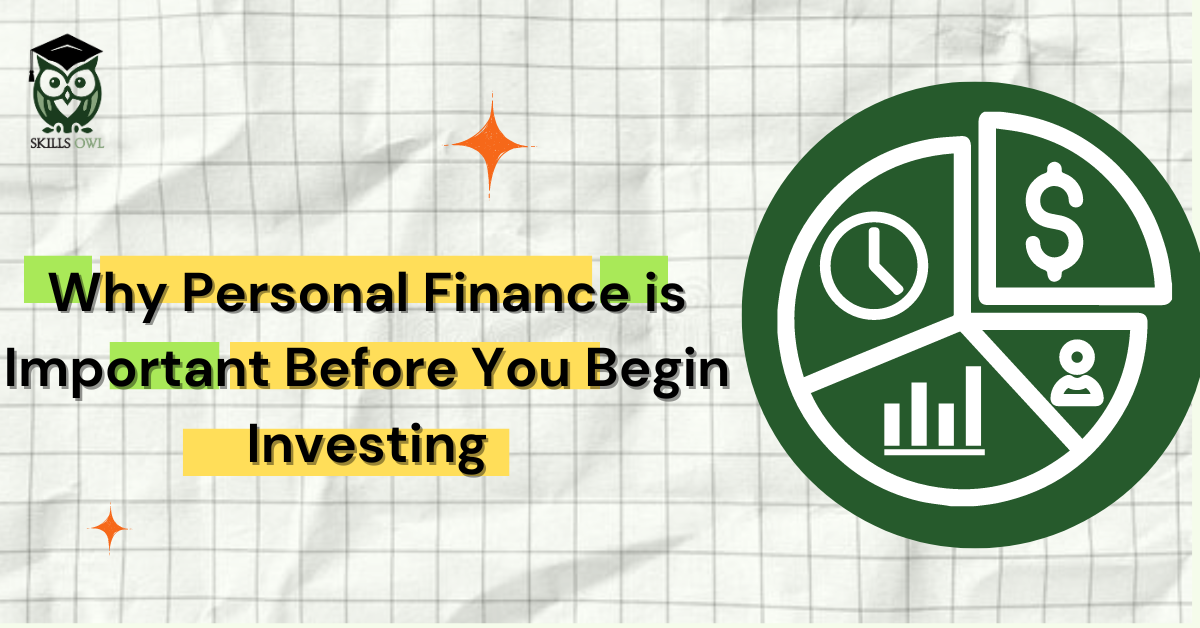
Why Personal Finance is Important Before You Begin Investing
Have you ever wondered why some people flourish through investments so easily while others barely manage to get by? In most cases, the secrets lie not in the investment strategy but in their financial approach. In other words, one needs to understand and master the basics of personal finance before they ever think of entering into stocks, bonds, or even real estate. Let’s explore why establishing a strong financial foundation is key to successful investing.
Understand the Importance of Personal Finance
Personal finance is, in fact, the foundation stone for successful investing. It’s sort of like preparing the soil for seed planting. Without good preparation, even the best seeds – or for that matter investments – will not flourish.
For instance, in a 2023 FINRA survey, there is a 44% chance that individuals who have good personal finance skills can make the right investment decisions and attain long-term financial goals. This means the importance of personal finance for our future financial lives.
Mastery of personal finance is rather more than money management; it presents an avenue for generating future wealth through investment. It equips you with all information on dealing with risk, managing your cash flow, and even the know-how in making decisions on where and when to invest your money.
What is Personal Finance?
Personal finance involves all the financial activities and decisions that are made by individuals and families so that money can be used effectively. Some of these include:
- Budgeting and expense tracking
- Saving money for short-term and long-term goals
- Managing debt and credit
- Taxation or knowledge of financial regulations
- Creating a fund for emergency cases
- Retirement planning
All of these form a very strong financial foundation that outlines the essential premise of opening the doors to this world of investments.
Best Practices for Personal Finances Before Investing
Before you get to dream of making that cut in the stock market or rental property income, it pays to start with solid personal finance. Here are some best practices to consider:
1. Budget
Know your money and expenditure. A good budgeting skill is only realized after making a comprehensive list of how one uses the money or expends it. Some various apps and spreadsheets can be used.
2. Stash for a Rainy Day
Save what equals 3-6 months of living expenses as a safety cushion against the monetary shocks that no one controls or expects. This way, you won’t need to withdraw money from investments at unripe moments.
3. Pay off High-Interest Debt
Target credit card balances and personal loans. What you save in interest often is more valuable than any possible returns from an investment.
4. Track your Cash Flow
Understand when money comes in and goes out. It helps in timing investments and avoiding cash crunches.
5. Be more Educated
Learn about different financial products, tax implications, and basic investment concepts before risking putting your money at play.
Common Mistakes to Avoid
While building your financial foundation, watch for the following:
- Not taking into account that one needs a safety net – just in case: Most people usually end up investing without ever having set up any sort of savings, thereby placing their finances at the mercy of financial emergencies.
- Failure to define clear goals: Without specific, measurable objectives, creating an effective financial plan or strategy for investment becomes hard.
- Debt influence underestimation: High-interest debts can offset investment gains. Invest only after most of the debt is paid off.
- Risk tolerance unknown: Personal finance helps you know the amount of risk you can face in investments.
- Insurance requirements not considered: As much as enough insurance safeguards your investment basis from unforeseen activities that may otherwise put you off course.
Why Personal Finance Skills Enhance Investment Success
Mastering personal finance before you start investing affords several benefits:
- Better managing of risk: Knowing how you stand financially helps you make informed decisions on just how much you can take in by way of risk with your investments.
- Better decision-making: One who understands personal finance will do a better job in evaluating investment opportunities to avoid falling victim to scams or highly risky ventures.
- More capital to invest: Good budgeting and saving habits translate into more capital available to invest at any time an opportunity arises.
- Long-term perspective: Personal finance skills give you a long-term perspective toward financial health, which goes well with how one should view successful investment strategies.
- Flexibility and resilience: One can usually ride out the worst of a market or economic downturn without panicking into the selling of investments or creating personal financial crises.
According to the National Financial Educators Council, people with developed personal finance skills tend to have diversified portfolios. This represents one aspect of how personal finance knowledge will impact investment behavior.
Conclusion
The path to successful investing is not about which stocks or real estate properties to pick but begins with getting the basics of your finances right. A good financial foundation stems from budgeting, saving, improving debt management, and getting some education on your finances.
Remember, you don’t have to choose between personal finance and investing: they are instead complementary skills that work together to build wealth. So, by prioritizing personal finance, you are not delaying your investment journey; you are doing it from a position of strength and knowledge when you do invest.
